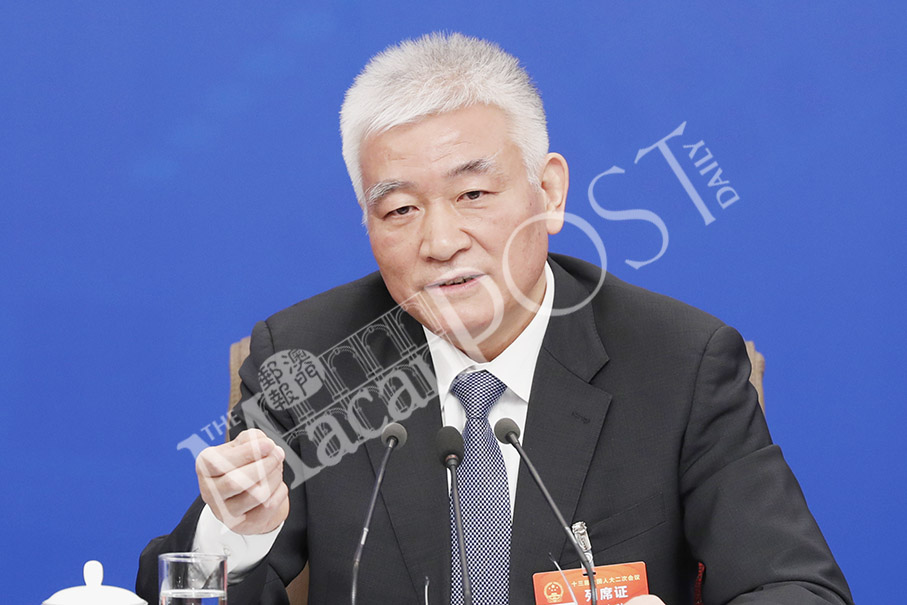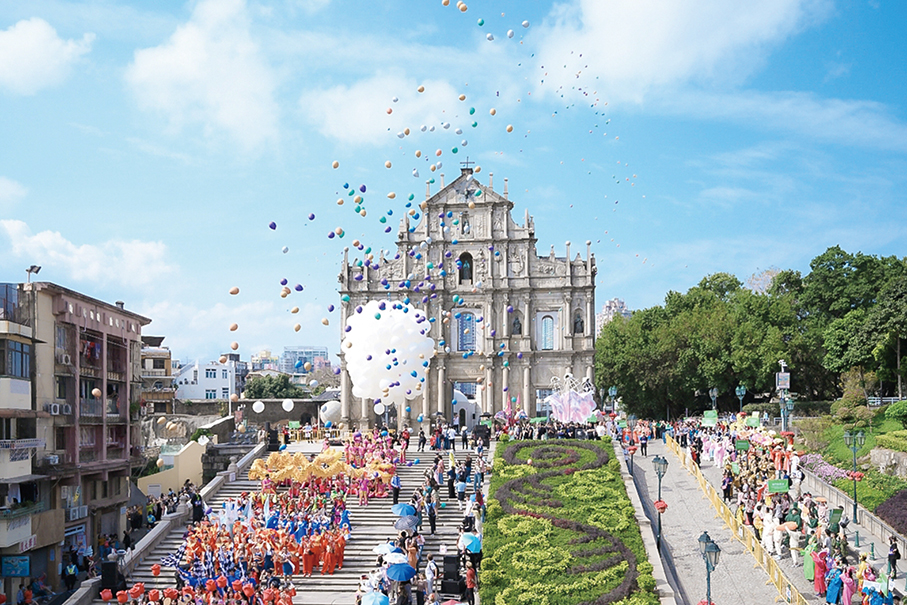Chief Executive Ho Iat Seng said yesterday that the way the government will give residents its annual “wealth-sharing” handout next year would depend on their views and the development of the COVID-19 pandemic, but he reaffirmed that the government would continue sharing the city’s wealth with residents in cash if “everybody” prefers it that way.
Speaking during a post-policy address press conference at Government Headquarters, the chief executive said that if the COVID-19 pandemic becomes less serious and consequently Macau’s employment situation improves next year, it would be “a good thing” for the government to share its wealth in cash, like in previous years.
The press conference, which lasted 100 minutes, took place after Ho delivered his 90-minute 2021 Policy Address to the Legislative Assembly (AL) yesterday afternoon.
The full version of the 2021 Policy Address states that next year’s government annual cash handout will remain unchanged at 10,000 patacas for permanent residents and 6,000 patacas for non-permanent residents, but it also states that “the form of distribution will depend on the circumstances”.
Ho told local civic leaders last month that since it was “impossible” for the local government to predict the future development of the COVID-19 pandemic, it would need to study how its “wealth-sharing” handout scheme could stimulate the local economy, consumption in particular, and stabilise the employment of staff in local micro-, small- and medium-sized enterprises (MSMEs). A few days later, Ho told reporters that the government would “constantly” study the possibility of changing its way of sharing the city’s wealth with residents next year, but he was quick to add that “if everybody prefers cash, [the government] will continue [sharing the city’s wealth] in cash [next year]”.
During yesterday’s press conference, Ho was asked by reporters about the government’s possible change in its way of sharing the special administrative region’s wealth with residents next year. Ho said that the government was open to listening to various views from civil society on the matter, but he also underlined that the government’s consumption subsidy scheme has helped boost the local economy and stabilise employment.
The first phase of the government’s consumption subsidy scheme, a 3,000-pataca consumption smartcard, ran between May and July, while the ongoing second phase of the scheme, a 5,000-pataca top-up to the card, is running between August and next month.
“If everybody has a consensus that the handout should be distributed in cash, [the government] will continue [sharing the MSAR’s wealth] in cash [next year],” Ho said, reassuring that the handout is part of next year’s government budget.
Ho was quick to add that “but how the handout will be distributed will depend on the changes in the COVID-19 pandemic, and [the government] will still have plenty of time to make a decision [on the matter]”.
Consumption subsidy stabilises employment: Ho
Ho also said that the consumption subsidy scheme has “obviously” stimulated consumer spending since its launch in May, adding that 75 percent of the subsidy has been spent in the “cha chaan teng” (traditional Hong Kong and Macau-style café) sector in particular.
Ho said that the consumption subsidy scheme has enabled the local MSMEs to stay in business, which has helped stabilise local employment as well.
Ho said that this year’s cash handout, which was paid to residents in April, did not stimulate local consumption, adding that the handout turned out to be merely “a transfer of money from the government to residents’ bank accounts”.
Ho said that in addition to the administrative procedures of the annual cash handout, the government was now also familiar with the procedures of issuing consumption subsidies to residents. “The government is now very familiar with both tasks,” Ho said.
Ho urged residents to think about the way the annual cash handout should be distributed in the long term.
Ho underlined that the government’s way of sharing the city’s wealth next year would depend on the development of the COVID-19 pandemic. “If the COVID-19 pandemic improves – i.e. becomes less serious, causing Macau’s employment situation to return to normal it would be a good thing for the government to share its wealth in cash like previously, which would help many grassroots households in buying [their daily necessities], in which case they could choose to buy things outside Macau,” Ho said.
Ho also pointed out that next year’s cash handout will be paid to residents in July, the same arrangement as in previous years, while only this year’s timing of the cash handout was different as the government brought forward the payout to April in response to the adverse impact of the COVID-19 pandemic on the local economy. Ho also said that therefore the government would surely decide before July next year on the way of distributing next year’s “wealth-sharing” handout.
Possible extra financial support
When asked about whether the government will roll out a third round of financial support measures for residents and businesses alike, Ho said that it would “really” depend on the development of the COVID-19 pandemic.
“If the COVID-19 pandemic stabilises – or COVID-19 vaccines become widely available, Macau would be able to welcome tourists from many areas around the world and its economy would improve, in which case the government would not have to roll out the third round of financial support measures,” Ho said.
“[But] if local MSMEs still have difficulties in running their business next year due to the still serious COVID-19 pandemic, the government would not rule out implementing financial support measures that accurately benefit those in need,” Ho said.
Gaming law public consultation
Meanwhile, Ho was also asked by reporters about the government’s ongoing preparations for its bidding process for the granting of future gaming concessions in the run-up to the expiration of the city’s three gaming concessions and three sub-concessions in 2022, as Ho states in his 2021 Policy Address that the government would propose amendments to the city’s current gaming industry law next year.
Ho said that the government will hold a public consultation first before drafting amendments to the gaming law. Ho pointed out that according to the full version of the 2021 Policy Address, the government plans to submit a bill amending the gaming industry law to the legislature for debate and vote in the fourth quarter of next year, but whether the schedule could be achieved would depend on the outcome of the public consultation to be held next year.
Ho underlined that the government still has time to prepare for the future gaming concession bidding process, which he described as a “complicated” matter, as there are still about two years left before the expiration of the current gaming concessions and sub-concessions in 2022.
Observers have pointed out that amendments to the current gaming law would be needed to solve the “historical issue” of the current gaming concession and sub-concession model – the gaming industry’s “3+3” system – as the gaming law stipulates that a maximum of three gaming concessions were to be granted.
Ho also said that the government will continue ensuring the sound development of the city’s gaming industry. Ho also said that the government’s economic diversification drive does not mean that it will have to deliberately undermine its pillar industry – the gaming sector.
Entry ban on foreigners needed
Meanwhile, Ho also underlined the Macau government’s continued need to impose an entry ban on foreigners so as to protect the city from COVID-19 risk. Ho pointed out that not only Macau but other countries and regions all over the world have also been implementing similar entry bans. Ho said that, for instance, Portugal currently bars foreigners from entering its national territory, and Hong Kong also bars non-Hong Kong residents from flying to the airport.
Ho also said that the Macau health authorities will need to prepare for the possible COVID-19 situation in which Macau residents studying overseas, such as in the UK and the US, would like to return to the city during the upcoming Christmas holiday period. Ho said that while the students will not be able to return to Macau via Hong Kong, they could still choose to return to Macau via Taiwan or South Korea. Ho also pointed out that only 35 out of the some 4,000 who returned to Macau from overseas in March and April were confirmed to have been infected with the novel coronavirus disease.
Sandwich class housing needed
Meanwhile, Ho also said that Macau would need housing projects for Macau’s sandwich class. Ho said that young people or those who do not live with senior citizens have only a small chance of buying a subsidised home-ownership scheme (HOS) flat.
Ho said that’s why the government is currently carrying out a public consultation asking residents how the sandwich class should be defined and whether sandwich class housing is needed in the city.
Ho said that only after civil society agrees that there is a need for sandwich class housing projects would the government announce where it plans to build them.
Ho also said that Macau is “frequently” facing cybersecurity issues as “many” hackers from foreign countries have been attempting to attack local institutions’ networks, including universities. Ho pledged that the local government will continue protecting local security and national security.
Cross-departmental communication failure
Ho was also asked about the Health Bureau’s recent decision to suspend a new measure which would have required players in all local sports events to be tested for COVID-19 every seven days after considering the difficulties the relevant government entities – the Sports Bureau (ID) and the Education and Youth Affairs Bureau (DSEJ) – would have faced in implementing the measure.
Ho admitted that it was the example of a failure in the government’s cross-departmental communication. Ho said that the Health Bureau, which has been tackling the COVID-19 risk for a long time, quickly rectified the issue, instead of insisting on pushing ahead with the new measure, in coordination with Secretary for Social Affairs and Culture Elsie Ao Ieong U.
Ho said that “if you want someone to be accountable, that’s my problem” – as he heads the Novel Coronavirus Response and Coordination Centre.
“Saints sometimes also commit mistakes, like everyone,” Ho said.
Ho urged residents to show understanding for the Health Bureau which has been working very hard to fight the novel coronavirus since early this year.
Chief Executive Ho Iat Seng delivers his 2021 Policy Address in the hemicycle of the Legislative Assembly in Nam Van yesterday afternoon. – Xinhua
Media workers attend Ho Iat Seng’s post-policy address press conference at Government Headquarters yesterday evening. Photo: Iong Tat Choi






